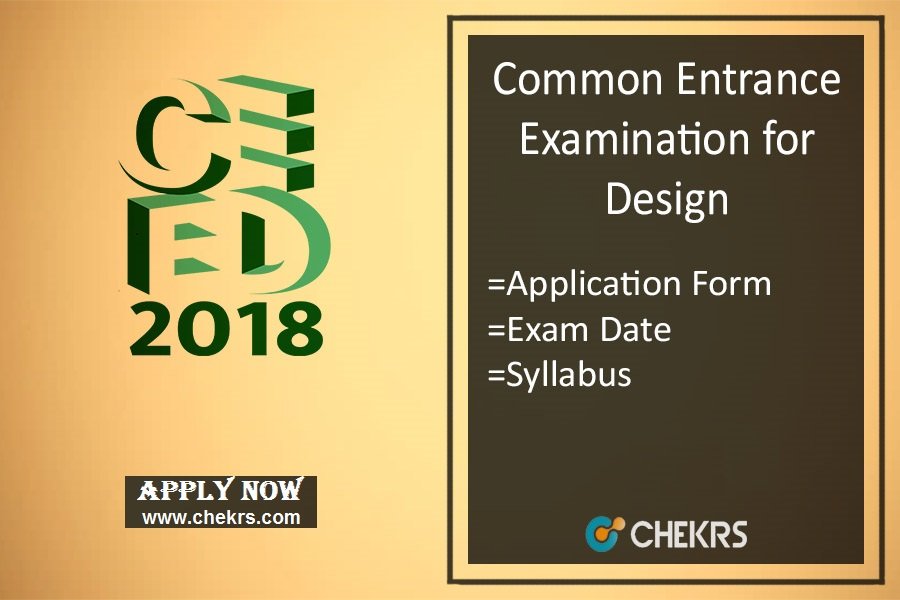CEED 2018 (डिजाइन के लिए आम प्रवेश परीक्षा): The Indian Institute of Technology Bombay conducts Common Entrance Examination for Design on behalf of Ministry of Human Resource Development. The students seeking admissions in M.Des and PhD programs can apply for the CEED 2018 Application Form. The forms will be released on 9th October and end on 10th November 2017. The students need to submit the form before the due date to take part in CEED Admission 2018 procedure.
CEED Preparation Tips || UCEED Application Form

CEED Application Form 2018
The students have to submit the CEED 2018 Registration on the official website. The last date for the submission along with the late fees is 17th November. The students have to submit the form successfully to appear in the entrance exam. We have provided a direct link for the submission of the CEED online Application Form. They just have to follow some precise procedure for the submission of the form.
Steps to submit CEED Exam Form 2018.
- The students have to access the official website.
- Then they have to click on the register button.
- Start filling the application form with your correct details carefully.
- Now attach the scanned copy of the documents, photograph and signature along with the form in a prescribed size.
- The students have to pay the required application fee.
- After payment, submit the form by clicking on the submit button.
- Also, take a print for the future reference.
CEED Application Fee
- For General: Rs.2200 +GST
- For SC/ST/PwD/ Female: Rs.1100+GST
- The fee will be paid only via online banking modes.
- The fee for the application is non-refundable.
CEED Exam Date 2018
| Events | Dates |
|---|---|
| Commencement of Application Form | 9th October 2017 |
| Deadline for the submission of Application Form | 10th November 2017 |
| Submission of Form with Late fee | 11th to 17th November 2017 |
| Admit Card will release | 25th December 2017 |
| CEED 2018 | 20th January 2018 |
| Draft Answer key Released for Part A | 27th January 2018 |
| Deadline for the comments on Part A Answer key | 4th February 2018 |
| Announcement of Result | 5th March 2018 |
| Scorecard Download | 5th March 2018 |
CEED Eligibility
The aspirants need to check the CEED Eligibility 2018 before applying for the application form.
Age Criteria
- There is no age limit for the CEED 2018 Exam.
Nationality
- The aspirant must be an Indian Citizen.
Educational Qualification
- The aspirant must have completed Diploma/ Degree/ Post Graduate Degree or GD Arts Diploma Program from a recognized University.
- They must have score minimum 60% marks in their Qualifying Exam.
Number of Attempts
- There is no limit to appear in the entrance exam.
CEED Exam Pattern
- Name of Exam: CEED 2018
- Number of Exams: Two papers will be conducted for the CEED Exam. The student who will qualify the Part A Exam only they will get eligible for Part B.
- Mode of Paper: Part is online exam and Part B is an Offline paper pen-based exam
- Type of paper: Multiple Choice Questions and Numerical Answer Questions
- No of Questions: 50
- Duration: Part A will be of 1 hour and Part B will be conducted for 2 Hours
- Marking Scheme: Two marks will be awarded for every right answer
- Negative Marking: .6 Marks will be deducted for the 1st and 3rd section of Part A.
| Section | No of Questions | Total marks | Duration |
|---|---|---|---|
| Section-1 | 5 | 10 | 1 Hour |
| Section-2 | 10 | 20 | |
| Section-3 | 35 | 70 | |
| Total | 50 | 100 |
CEED Syllabus 2018
Part A Syllabus of CEED 2018
- Visualization and spatial ability
Pictorial and diagrammatic questions to test the understanding of transformation and/or manipulation of 2D shapes and 3D objects and their spatial relationships.
- Environmental and social awareness
General awareness of environmental factors such as climate, population, water, vegetation, pollution, weather, natural resources etc., and their implications on the design of products, images, infrastructure and environment. Awareness of design terminologies, social and rural connection with the design, history of the designed artefact, and socially responsible and environmentally sustainable design responses. History of art, sculpture and literature.
- Analytical and logical reasoning
Ability to analyse given information logically and select the most appropriate solutions. Ability to weigh opinions, arguments or solutions against appropriate criteria. Ability to use logic and structured thinking to deduce from a short passage, which of a number of statements is the most accurate response to a posed question.
- Language and creativity
Ability to understand passages in commonly used English language. Ability to think creatively in terms of alternatives, ability to distinguish innovative options and think out of the box.
- Design thinking and problem solving
Ability to understand the context, the users and the constraints and select the most appropriate solution for a given design problem.
- Observation and design sensitivity
Ability to detect concealed properties in the day to day life and think critically about them. Ability to discern subtle differences in visual properties and aesthetic outcomes.
Upcoming Scholarships || GATE 2018
Part B Syllabus of CEED 2018
- Drawing
Ability to draw products, people or scenes in proportion with good line quality, composition, proportion, perspective, and shading.
- Creativity
Ability to think out of the box and come up with unique as well as diverse solutions.
- Communication skills
Ability to communicate concepts and ideas clearly with the help of text and visuals.
- Analytical and problem-solving skills
Ability to understand the user and the context, knowledge of properties of materials and process and their appropriate use in Design, Originality of solutions, ability to create characters, plots and stories, etc.
